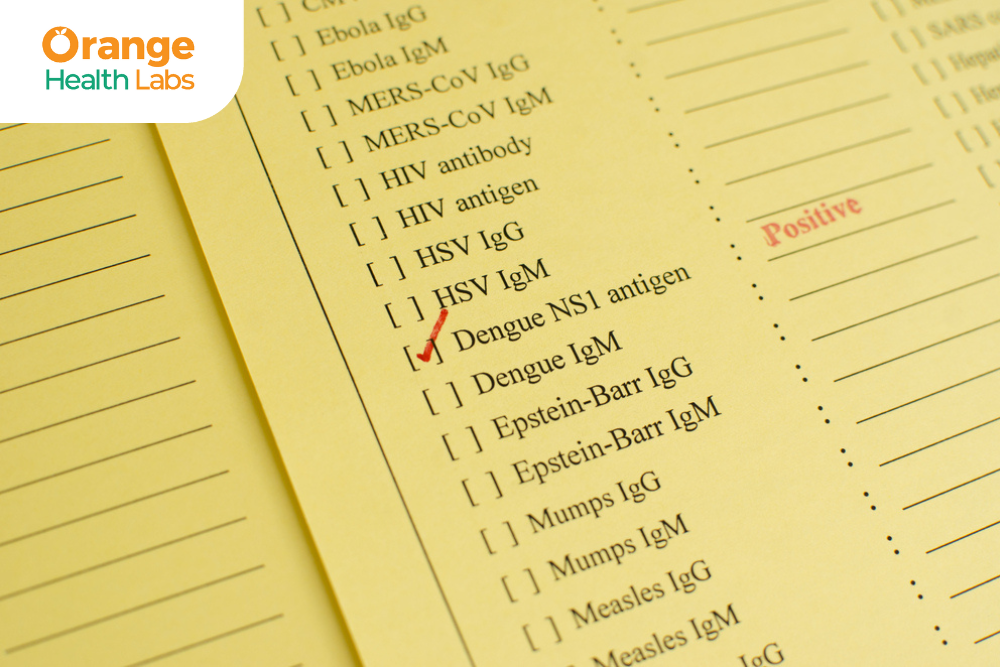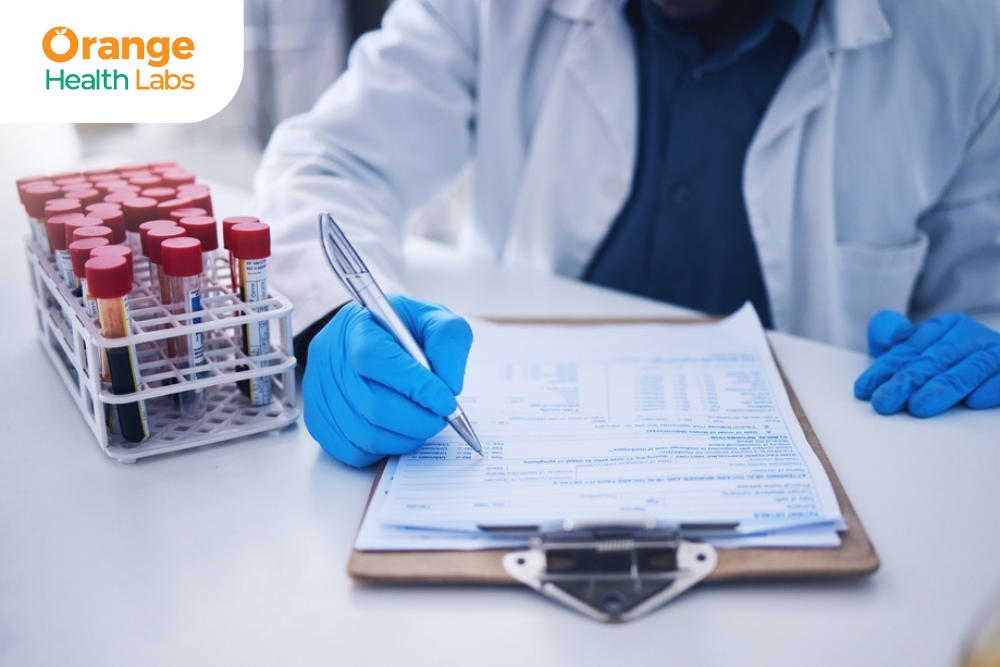Search for tests or checkups
SupportHow to Interpret Dengue Test Results

Dengue fever, caused by the dengue virus transmitted through the Aedes aegypti mosquito, is a significant public health concern in tropical and subtropical regions, especially in urban and semi-urban areas. The virus is primarily transmitted by infected female Aedes mosquitoes during the daytime. In recent years, the incidence of dengue has been on the rise, with approximately 390 million infections occurring worldwide annually. In 2023, the World Health Organization (WHO) reported the highest number of cases, reaching around 6.5 million, with 7300 dengue-related deaths.
Dengue fever can vary in severity, with severe cases leading to complications such as dengue haemorrhagic fever (DHF), organ damage, and liver injury. Testing for the dengue virus is important for early detection to prevent dengue-related complications and death. It allows prompt initiation of the treatment and reduces the dengue-associated damage in the body. Therefore, timely and accurate diagnosis is recommended for effective management and prevention of complications.
Types of Dengue Tests
NS1 Antigen Test:
The NS1 Antigen Dengue test checks for the presence of the dengue virus NS1 antigen in the blood. NS1 antigen is typically observed during the acute phase of infection, usually within the first week after the onset of symptoms. The test is most effective in the early stages of the disease when viral levels are high.
IgM Antibody Test:
This test checks for the presence of IgM antibodies in the blood, indicating recent or current infection. IgM antibodies are produced by the immune system in response to a dengue virus infection. They are usually detectable within 4-5 days after the onset of symptoms and may remain elevated for several weeks.
IgG Antibody Test:
IgG antibodies develop later in the course of infection and persist for a longer period in the body. The presence of IgG antibodies can indicate a past dengue infection or immunity to the dengue virus. IgG antibodies are typically detectable a few weeks after symptom onset. The IgM/IgG antibody ratio can help differentiate between a primary infection (when a person has a dengue infection for the first time) and a secondary infection (when a person has had a dengue infection previously) of dengue.
Understanding Your Dengue Test Results
The results for NS1 antigen are expressed as positive or negative. Similarly, the IgG and IgM antibody test results are expressed as either positive or negative based on the measurement of dengue antibodies in your blood sample. A positive result indicates the presence of antigens or antibodies specific to the dengue virus. While this suggests a dengue infection, further confirmation is necessary through various tests. A negative result indicates the absence of dengue antigen or antibodies in your sample. This usually indicates that dengue may not be the cause of your symptoms.
Interpreting dengue test results requires an understanding of the significance of NS1 antigen and IgM and IgG antibodies in different stages of infection.
In the early stages of dengue infection, typically within the first few days after symptoms appear, the NS1 antigen level is typically high, as it is a protein produced by the virus itself. So high NS1 antigen results usually indicate a current dengue infection.
IgM antibodies also typically start to rise at this time, although they may not be detectable in the blood yet. IgG antibodies are usually low during the early stage. As the infection progresses, usually after about a week, both IgM and IgG antibodies become detectable in the blood. IgM antibodies tend to peak during the acute phase of the illness, usually around 2 to 3 weeks after the onset of symptoms. IgG antibodies continue to rise and usually peak a few weeks after IgM levels peak. At this stage, the NS1 antigen may start to decline as the body's immune response becomes more effective in clearing the virus.
When the symptoms begin to resolve, IgM levels begin to decline while IgG antibodies remain in the blood. The level of NS1 antigen becomes undetectable.
NS1 Antigen Test Results Explained
Detection of NS1 antigen in the blood is indicative of acute dengue infection. NS1 antigen is typically detectable during the early stages of infection when viral levels are high. A positive NS1 test result indicates the presence of the dengue virus in the blood, confirming acute infection. A negative result means that the virus could not be spotted in your sample. However, this does not rule out dengue infection, it may just indicate that the test was performed outside the window period for NS1 detection.
IgM and IgG Antibodies Tests Interpretation
IgM Antibody Test:
A positive IgM test result suggests a recent or current dengue infection. The test is most reliable when performed within the first week of illness onset. A negative IgM result before the 8th day of the illness may be deemed unconfirmed and require additional testing after the 7th day of illness. Thereafter, a negative result means that the patient is negative for recent dengue infection.
IgG Antibody Test:
A positive IgG test result indicates past infection or immunity to dengue virus. It is most reliable when performed several weeks after symptom onset. IgG antibodies persist for months to years following infection, providing long-term immunity against dengue virus.
When both IgM and IgG tests are positive, it indicates a recent dengue infection, whereas a positive IgG and negative IgM tests indicate a past dengue infection.
It is important to note that a negative result could also stem from testing too early as these antibodies may not have developed sufficiently in your body. Consequently, you may be recommended repeat testing for reassessment.
Factors Affecting Test Accuracy
Many factors such as the duration of testing, onset of fever, age, type of dengue virus, history of vaccination, previous infection by dengue virus or flavivirus, and individual’s immunity can affect the accuracy of the test, which can lead to false positives and negatives. For example, children who have taken the dengue vaccine may have developed antibodies against it, leading to false positive results in antibody tests.
False positives can arise from cross-reactivity with other viral infections or early testing while false negatives may occur due to early testing or low antigen/antibody levels. Cross-reactivity is a phenomenon that can affect the accuracy of tests. It occurs when the antibodies produced by your immune system to fight one virus mistakenly react with a different virus. In the case of dengue testing, this means that the test might show a positive result for dengue even if you have a different viral infection.
If you test negative and are recommended for re-testing, follow your doctor’s advice closely.
Importance of Medical Advice and Monitoring Symptoms
Seeking medical advice and monitoring symptoms are pivotal in managing dengue fever effectively. Here's how they help:
- They help in the early identification of dengue fever, allowing timely initiation of treatment.
- They also help differentiate dengue from diseases with similar symptoms.
- Timely medical advice can prevent severe complications like dengue haemorrhagic fever and shock syndrome.
- Healthcare providers can provide specific treatment plans based on the medical history and the patient’s symptoms.
- Patients can receive education on preventive measures for reducing the spread of dengue to others.
Conclusion
Understanding your dengue test results is crucial for proper disease management. Whether it's a positive or negative result, consulting a healthcare provider for an accurate interpretation of the result and appropriate treatment options is essential. Timely and accurate diagnosis plays a key role in the effective management and prevention of complications associated with dengue fever.
Book Dengue Test in your city: Dengue Test in Mumbai | Dengue Test in Bangalore | Dengue Test in Noida | Dengue Test in Hyderabad | Dengue Test in Gurgaon | Dengue Test in Faridabad | Dengue Test in Delhi

The Role of CBC Tests in Monitoring Treatment Efficacy

Impact of Alcohol on Liver Function Tests: What You Should Know
